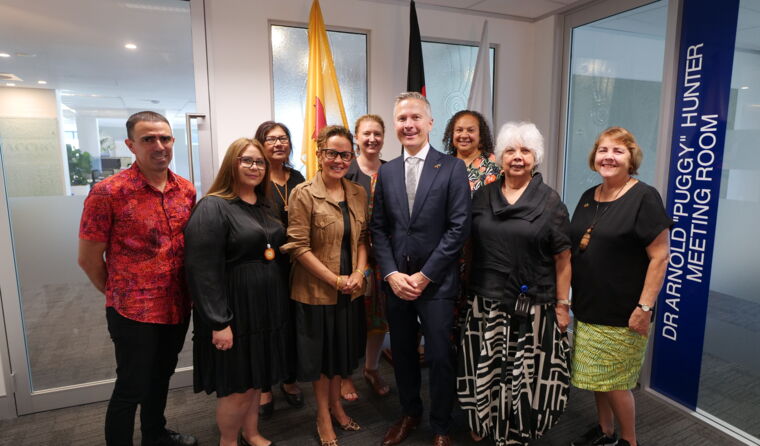News
RACGP–NACCHO agreement to ‘drive systemic change’
The organisations have signed an MoU to jointly advocate for effective healthcare for Aboriginal and Torres Strait Islander people.
 NACCHO Board Chair Donnella Mills and RACGP President Dr Michael Wright signing the RACGP–NACCHO MoU. (Image: Jake Pinskier)
NACCHO Board Chair Donnella Mills and RACGP President Dr Michael Wright signing the RACGP–NACCHO MoU. (Image: Jake Pinskier)
The RACGP and the National Aboriginal Community Controlled Health Organisation (NACCHO) have renewed their commitment to jointly advocate for culturally safe and clinically appropriate healthcare for Aboriginal and Torres Strait Islander people.
On Thursday, the two organisations signed their third Memorandum of Understanding (MoU) in Canberra, on Ngambri and Ngunnawal Country, guided by three principles:
- Self-determination, equity and strengths-based approaches
- Cultural safety and eliminating racism and discrimination
- Shared decision making and respecting the expertise, membership and role of each organisation
Under the new MoU, the RACGP and NACCHO’s collaborative activities will include shared advocacy, consultation on key policy documents, joint development and delivery of resources, and supporting RACGP members working in the Aboriginal Community Controlled Health Organisation (ACCHO) sector.
It will also see the promotion of the ACCHO model of care, including community governance, multidisciplinary team care and the role of Aboriginal and Torres Strait Islander health practitioners and health workers.
RACGP Aboriginal and Torres Strait Islander Health Chair Dr Karen Nicholls was in Canberra for the signing and told
newsGP it was a ‘privilege to be there’.
‘If we’re looking at closing the gap, it will definitely help ensure the RACGP is doing it in a way that will be meaningful and impactful, and highlighting the importance of the community controlled sector in delivering that culturally safe and comprehensive care,’ she said.
‘A culturally safe, respectful health service can have a huge impact on the life of an individual and their families and the communities and it helps empower individuals to have control over their health and the issues that matter to them.
‘It engages people in actively seeking healthcare and preventive healthcare, so rather than coming when illnesses have progressed further down the track, it gives people the confidence that they can present to a health service early, and they can be listened to, they will be respected.’
 The RACGP–NACCHO MoU was signed in Canberra, on Ngambri and Ngunnawal Country, on Thursday. (Image: Jake Pinskier)
The RACGP–NACCHO MoU was signed in Canberra, on Ngambri and Ngunnawal Country, on Thursday. (Image: Jake Pinskier)
NACCHO Board Chair Donnella Mills highlighted the importance of keeping Aboriginal and Torres Strait Islander health at the forefront of national healthcare priorities.
‘Healthcare for our people is about more than treatment – it is about respect, self-determination, and ensuring our voices shape the services designed for us,’ she said.
‘This MoU strengthens our ability to work alongside the RACGP to advocate for an equitable and culturally safe healthcare system.’
NACCHO and the RACGP have worked together for more than two decades, with their first MoU signed in 2014 and renewed in 2019.
Since then, both organisations have seen significant changes, including GP training transitioning to the RACGP and the growth of NACCHO’s health policy and program development.
Together, their work has included the creation of key resources, including the
National guide to preventive healthcare for Aboriginal and Torres Strait Islander people, which was
launched in November.
The guide is now used in general practices and ACCHOs across Australia.
NACCHO Chief Executive Pat Turner said the agreement also works to highlight the critical role of these ACCHOs in delivering culturally safe, comprehensive care.
‘For over a decade, this alliance has driven advocacy, informed policy, and supported high-quality, community-led care through our ACCHOs,’ she said.
‘It also underscores the need for genuine cooperation that prioritises equity, self-determination, and the elimination of racism in healthcare.
‘We look forward to continuing our partnership with RACGP to drive systemic change, shape policies, and create healthier communities.’
Log in below to join the conversation
Aboriginal and Torres Strait Islander health Closing the Gap NACCHO
newsGP weekly poll
Would it affect your prescribing if proven obesity management medications were added to the PBS?